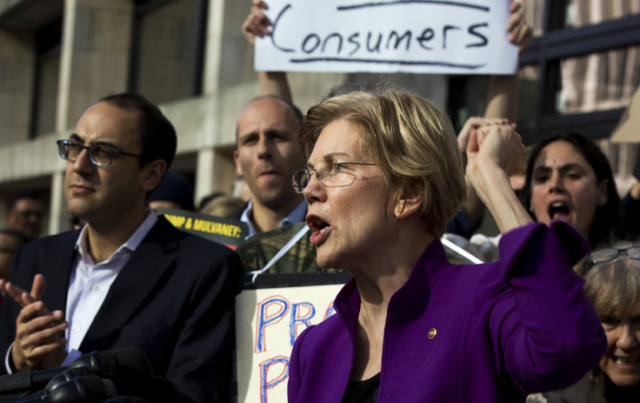Democrats on Friday celebrated after the Supreme Court rejected a challenge to the Consumer Financial Protection Bureau’s (CFPB) funding structure.
“The United States Supreme Court follow the law, and the CFPB is here to stay,” said Sen. Elizabeth Warren (D-Mass.), speaking from the steps of the Supreme Court.
Warren was one of the chief architects of the CFPB, which was established through the Dodd-Frank Wall Street reform law to enforce consumer protection laws and crack down on predatory lending. Since then, the CFPB said it has clawed back $20 billion for consumers.
“When you have an agency that is this good at doing its job to protect consumers, then a lot of banks, a lot of payday lenders, a lot of Republicans come after it and try to shut it down,” she continued.
Some Republicans have argued the CFPB’s funding structure is unconstitutional as it is not funded directly through the appropriations process. Other banking regulators, including the Federal Reserve, are funded through fees and penalties paid by firms they regulate.
But the Supreme Court voted 7-2 to dismiss the challenge brought by two lender trade associations, which argued that because the CFPB receives its funding from the Federal Reserve, it violated Congress’s appropriations authority.
Justices Samuel Alito and Neil Gorsuch were the two dissenting votes. Justice Clarence Thomas authored the majority opinion that sided with the Biden administration.
“Under the Appropriations Clause, an appropriation is simply a law that authorizes expenditures from a specified source of public money for designated purposes,” Thomas wrote.
“The statute that provides the Bureau’s funding meets these requirements. We therefore conclude that the Bureau’s funding mechanism does not violate the Appropriations Clause.”
After the decision came down, House Financial Services Committee Chair Patrick McHenry (R-N.C.) vowed “Republicans will continue the fight to rein in the rogue CFPB.”
He also called on the House to pass Rep. Andy Barr’s (R Ky.) CFPB Transparency and Accountability Reform Act, which would remove the bureau from the Fed system and bring it under the appropriations process, among other provisions.
Rob Nichols, president and CEO of the American Banker’s Association, said the powerful lobbying group would “continue to call on Congress to establish more accountability for the Bureau.”
AFP




















